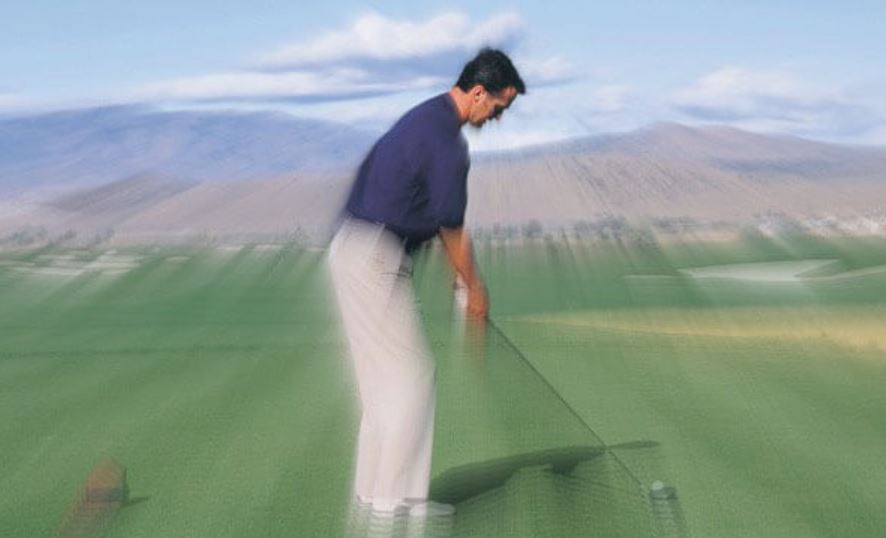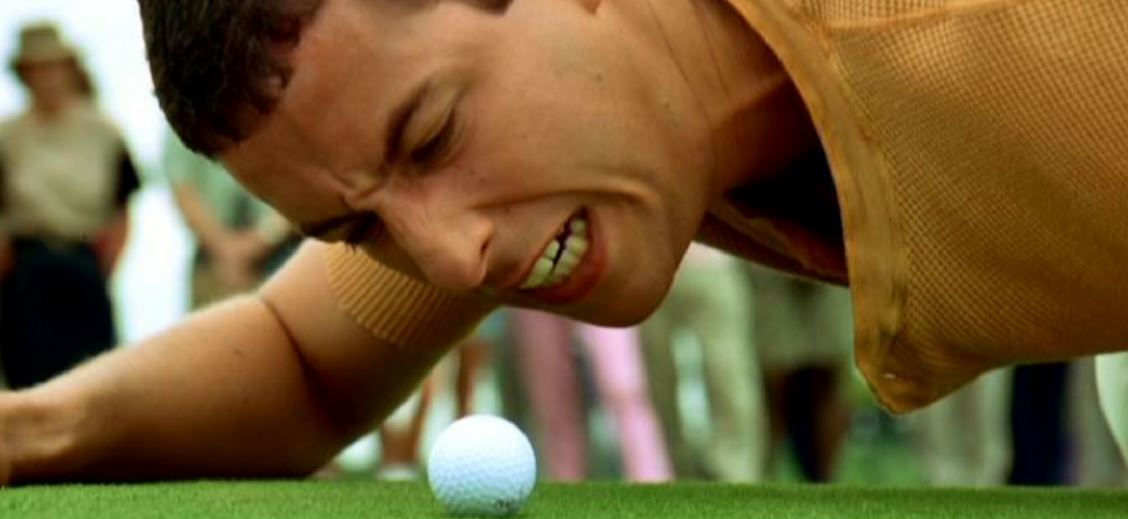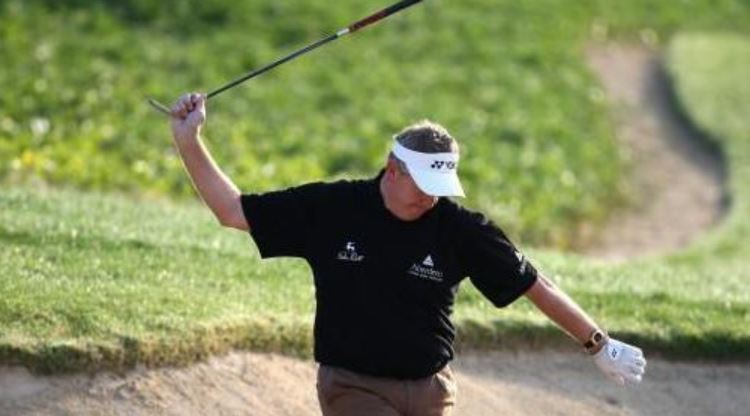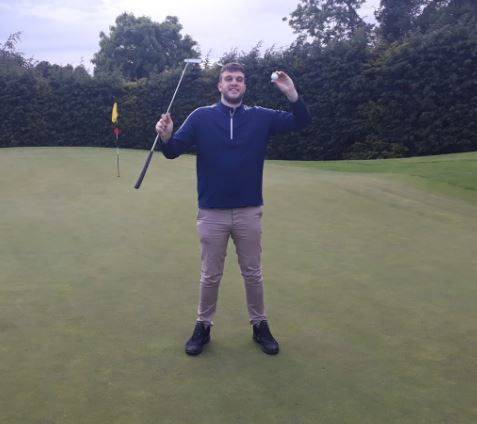How To Improve Your Mental Golf Game And Why It’s So Important

As the great Bobby Jones said, “Competitive golf is played mainly on a five-and-a-half-inch course… the space between your ears.”
With that in mind, it always amazes me how few amateur golfers take time to work on their mental game. How many people you know invest heavily in new equipment, lessons, maybe even exercise regimens yet do no work on the mental aspects of golf performance?
Your mental golf game works in exactly the same way as your physical golf game, if you put time into it you will see results. Some may not know where to start, others may not really buy in to this concept and others may just can’t be bothered. However, it is one of the best things you can do.
There’s no question that Tiger Woods took the mental side of golf performance to a new place when he changed golf in the early 2000’s.
Using military psychological techniques, he became mentally bullet-proof on course. You won’t get to that level, but some work can bring big rewards.
Today on the blog we are going to dig into this. We will breakdown how you can start working on your mental game and start building these skills for your game. It’s time to go mental.
How Do I Get Better At Golf Mentally?
First thing is first, the best thing to do is to start and make some time to commit to building these skills consistently.
If you like to practice your swing or short game for an hour per week, find another thirty minutes to work on your mental golf game.
One way to make a strong start to this process is to read some books or listen to some audiobooks specifically on this subject.
There are a number of books out there that can really help you on the course and in life in general, work your way through some of them and learn.
Reading List For Mental Golf Improvement
Title |
Author |
Golf is not a Game of Perfect |
Dr. Bob Rotella |
The Chimp Paradox |
Prof. Steve Peters |
The Mindful Athlete: Secrets to Pure Performance |
George Mumford |
How Champions Think: In Sports and in Life |
Dr. Bob Rotella |
It Takes What It Takes |
Trevor Moawad |
The list above contains the thoughts and strategies of psychologists who have worked with some of the biggest names in sport let alone golf.
Rotella has worked with many major winners, Mumford was Michael Jordan’s psychology coach and Peters worked with Team GB.
Each of these books will, in their own way, get some basic strategies into your game.
My favorite of them all for golf is the first one, “Golf is not a Game of Perfect”. This was the first golf psychology book I ever read and I recommend it to many golfers frequently.
How Can I Relax My Mind For Golf?
In golf we often create a fear for ourselves that is entirely in our heads.
Missing a putt has literally no danger linked to it, we cannot be physically harmed by hitting a bad shot yet our bodies act as if we are in real danger.
We need to make our bodies realise that we’re safe.
We can do this through a few methods and each of these helps relax the mind.
Remember, a calm mind operates complex kinetic movements best so we really want the subconscious mind engaged during every golf shot.
Box Breathing
Imagine standing beside a doorway, it’s you and your platoon, you know the enemy are in there but you have no idea how many there are or what weapons they have.
Now imagine having a six foot putt to save par on a sunny day at your golf club. Which is more stressful?
The military developed a breathing technique called box breathing to keep the mind calm during these stressful events.
Essentially, breathing in for four counts, hold for four, out for four, hold for four and repeat. This relaxes you by activating your parasympathetic nervous system, it works.
Visualization

This is something you hear about a lot from high-performers in many fields, not just sports and golf.
It is an investment and something you have to practice, however it can be one of the best things you will ever do for your golf game. It is all about tricking the brain, again.
Your brain doesn’t really know what is real and what is imagined, if you vividly visualize something then you can trick your brain into thinking it has happened.
This can help you de-stress in the moment. Picture hitting the perfect drive from the first, do this over and over, then rip it for real.
Practice Under Pressure
Another common technique is to practice something with a bit of pressure on yourself. Practice your short game with a friend and the loser has to buy drinks.
Give yourself a challenge you have to pass before you can go home that night. You can get creative here and push yourself.
The thing about this is that you are starting to recreate the pressure of the moment when it matters.
This can help you get used to being in that moment and dealing with it in an effective way.
The other benefit of this kind of practice is that it can be really fun.
Exposure
The last one and probably the most straight forward is to just expose yourself to pressure and go for the “sink or swim” approach.
Sometimes just putting yourself in the moment and learning how to deal with things is the best way of calming your mind down.
This is another long-term strategy for mental golf game improvement but nothing prepares you for battle like an actual battle.
I wouldn’t recommend starting here but it is absolutely something that should be a part of your mental improvement plan.
Is Golf A Mental Sport?

Yes. I have played golf for many years, I am a former professional golfer and I have hit more golf balls on the range than most.
However, one year I entered US Open Qualifying in Alabama, I was so nervous that my swing fell apart and I was almost afraid to take a shot, it was crippling.
Had I played the day before, or the day after, I would have been fine. My game was good, physically I was ready but mentally I wasn’t.
To play your best golf you absolutely have to have your head in the right place. For that reason, golf is absolutely a mental sport.
Why Is Golf So Hard Mentally?
Golf is an incredibly unique sport in that during a round you have so much time in your own head with your thoughts.
It is not a reactive sport in that a ball comes to you and you just perform in that second, you walk to the ball and can see what’s coming for a long time before you play.
You have to learnt to be able to switch the concentration on and off between shots.
You have to learnt to be strict with what you say to yourself.
Finally, nerves can kill your swing mechanics which in turn makes you more tense, it’s a downward spiral.
What Percentage Of Golf Is Mental?
It is really difficult to put a number on this.
Of course, learning proper technique and honing your golf skills will always be a vital foundation for your game, but by thinking well you can really get closer to the potential that those physical skills have created.
Think about your best round ever. What kind of things were you thinking about out there? Did you just point and shoot, knowing the ball would go where you want?
That’s the freedom that this can give you, it is easy to attribute 50% of your scores to your mental state, you could argue more.
How Can I Be More Confident During My Rounds?

There are many things you can do to help your confidence on the course.
The first thing to address is what specific mental issues are you having when you play? Do you suffer from first tee nerves? Chipping or putting yips? Final hole disasters?
A lack of golfing confidence can show up in many different ways and each require different remedies to properly fix them.
Let’s look at a couple of things you can do to help your on-course confidence.
Just Do It
There is a story about Jack Nicklaus, he was at a dinner event and he made a speech to the attendees.
He told them he had never missed a putt inside three feet. Someone sheepishly raised his hand and pointed out that wasn’t true. Of course, the man in the crowd was right.
So what does this tell us? It tells us that champions only believe that they are the best, they actively forget the mistakes they have made, this is a trick that takes time but it works.
Just choose to remember the great shots and the rest never even happened, easy.
Three-Shot Diary
This is an incredibly powerful tool and one I’ve recommended to a few friends going through really bad streaks. It is partly the technique above and partly visualization.
After every round you need to write down the three best shots you hit, I mean physically write with pen and paper.
Even in your worst round you will hit three good shots. Really commit to this and think vividly about those shots, mentally transport yourself there and play them over in your head like a highlight reel as you write.
This will reinforce those memories and have you confident quickly.
Practice Practice Practice
It really is that simple.
Nothing will get you more confident than putting in the time and practicing your game.
Working on your technique on the range, putting green, the course and in your head.
You will ingrain good habits and just feel better about your game because you are putting the time into it.
How Can I Get Better At Golf Fast?
The simple answer to this is that getting better at golf takes time.
The more practice you out into your physical and mental game then the better you will become.
To achieve this as fast as possible you have to commit to a consistent plan with a coach who can guide you to better.
How Do You Clear Your Mind Before A Golf Shot?

This is a really important thing to do if you want to play your best golf. Before each shot, the only thing that should be in your head is where you want the ball to go.
You must detach from any technical swing move, although sometimes a swing-thought can be useful.
The best way to achieve this sense of a clear mind is to focus absolutely on your target.
Forget the danger lurking for a missed shot, address them when you’re selecting your club. Once you are at address you must commit entirely to hitting the target that you have chosen, nothing else.
How Many Golf Lessons Should A Beginner Take?
Golf is a constant pursuit of better. If you want to just learn enough to get on a course and play then you can probably achieve this with about five to ten lessons.
However, I have been playing golf for over twenty-five years and I still get lessons to help me improve.
The best golfers in the world all have coaches who see them weekly.
Whilst that is absolutely overkill for a beginner, it does show that even the best in the game still want to get lessons.
I recommend you seeing a pro every couple of months at least to help your game.
Conclusion
The mental game of golf is entirely appreciated at the elite amateur and professional levels of the game, many average golfers don’t think it is something they should bother with though.
Hopefully this article has made you reconsider this and you are willing to at least try to improve this aspect.
Start by reading some of these books, the Rotella ones in particular are packed with great anecdotes so even if you don’t like the psychology lessons you will enjoy the golf stories.
Becoming a better golfer absolutely starts in the head and these books and tips will help.



